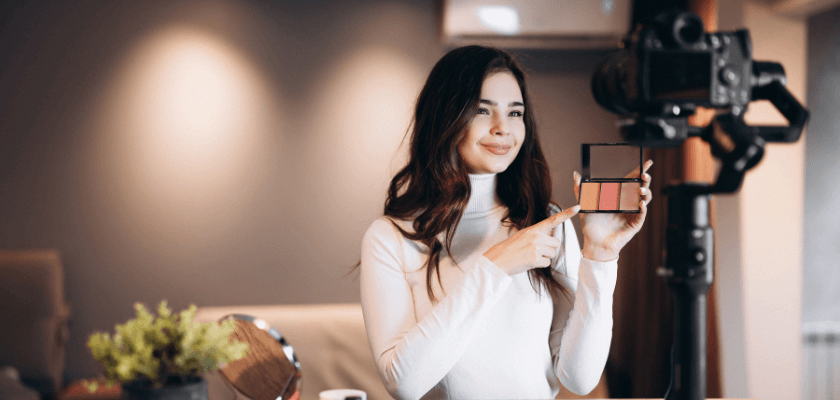
Unpacking the Advantages & Disadvantages of Influencer Marketing (Friend or Foe?)
We’re all aware of the fact that the digital age has ushered in revolutionary marketing strategies, with influencer marketing being one of the services that stands out. This is by no means a passing fad; rather, it has strengthened its place as a key component in influencing customer behavior and brand perceptions. However, as each phenomenon, there are advantages and disadvantages of influencer marketing as well and it’s essential to understand both the allure and the cautionary tales associated with it.
Imagine a world where traditional advertisements, once the giants of persuasion, are now sharing the spotlight with real people who wield their influence through personal stories and authentic connections. These influencers are not just celebrities but often everyday individuals who have managed to turn their passion into persuasive power.
However, the journey into influencer marketing isn’t without its bumps. Despite its appeal, a pressing question remains: Does influencer marketing truly deliver on its promises?
Advantages of Influencer Marketing
Influencer marketing benefits from the power of key opinion leaders to amplify your brand’s message, connecting with audiences on a personal and direct level. Here’s how influencers are changing the game for brands looking to make a real impact:
Enhances Brand Awareness and Reach
Influencer marketing’s main and most evident appeal is its significant capacity to increase brand visibility outside of traditional advertising spaces. Influencers, armed with their dedicated followers on platforms like Instagram, serve as modern-day heralds, broadcasting the brand’s message directly to screens of a highly engaged target audience.
Let’s say a micro influencer with a loyal, niche following shares a product experience. Rather than just a broadcast, it becomes a personalized recommendation reaching an audience that trusts and values the influencer’s opinions. Content from influencers increases purchase intent than traditional digital marketing efforts and 61% consumers trust influencer recommendations.
Influencer marketing has expanded with the rise in popularity of AI influencers. These digital characters, made using advanced algorithms, can interact with audiences anytime, delivering consistent brand messages. Aitana, created in 2023 by designer Rubén Cruz and his agency, The Clueless, is a leading example. She is Spain’s first AI influencer, a 25-year-old model who shares her fitness journey and love for gaming. Although a fictional digital persona, brands like Olaplex, Brandy Melville Spain, and Intimissimi pay her around $1,000 per post, and as you can see in the post above, she’s on a huge billboard right in the heart of Times Square!
Builds Trust and Authenticity
Influencer marketing thrives on the authenticity that influencers bring to their interactions. Unlike the often impersonal nature of traditional ads, influencers share their genuine experiences and stories, crafting a narrative that includes your brand. This creates a sense of trust and reliability among their followers – key components in today’s skeptical digital environment.
For instance, when a well-known lifestyle influencer shares their morning routine incorporating a specific skincare brand, their followers are likely to perceive this as a credible endorsement, as opposed to a scripted advertisement. The result? A stronger inclination to believe in, and try, the products themselves.
Sofia Richie’s wedding makeup went totally viral on TikTok last year, and suddenly, everyone was talking about the products used by her makeup artist, Pati Dubroff.
@sofiagrainge Attempting to recreate my wedding makeup! Sorry in advanced @patidubroff ♬ original sound – Sofia Richie Grainge
Mixing high-end brands like Chanel with everyday brands like Nudestix and Maybelline, the video showed you don’t have to break the bank to look like a star. This clever mix not only democratized beauty—making it clear that anyone could achieve this glamorous look—but also played into a brilliantly executed influencer marketing strategy. Products like the Nudestix Nudies Matte Cream Bronzer and Blush, the Chanel Eyeshadow Pencil, and Maybelline’s Lash Sensational Mascara became instant must-haves. Each item, accessible and luxurious, highlighted how everyday products could be part of something as elite and special as a celebrity wedding.
@patidubroff here’s how to get Sofia Richie’s WEDDING makeup look @sofiarichiegrainge #sofiarichiewedding #sofiarichiestyle #bridalmakeup #chanelbeauty #nudestix #welovecoco #makeupbymario #dibsbeauty #maybelline @chanelbeautyofficial ♬ Sunshine – WIRA
Basically, Sofia’s big day gave us major beauty inspo, proving you can get that A-list glow with stuff you might already have in your makeup bag. It was a win-win: cool products got the spotlight, and we all got to dream about glamming up with that celeb magic touch.
Drives Purchase Decisions
Influencers have the unique ability to sway their followers’ purchasing decisions through high engagement rates and direct calls to action. A compelling influencer marketing campaign can lead followers not just to “like” a post, but to actually visit a store or website and make a purchase. The direct correlation between influencer endorsements and increased sales is not to be underestimated; as reported by Mediakix, 80% of marketers find influencer marketing effective in driving sales and brand awareness.
Efficient Targeting of Audience
One of the important advantages of influencer marketing is the precision with which you can target your marketing efforts. Influencers, particularly nano and micro influencers, often create content for very specific demographics or interest groups. Engaging the right influencer in the right platform such as TikTok, Instagram or YouTube, allows brands to reach potential customers in a way that feels both personal and direct, without the scattergun approach of more traditional marketing.
Not only effective but this targeted approach is also cost-efficient – which all brands want. It ensures that your marketing budget is spent engaging with individuals most likely to be interested in your product, rather than a broader audience with lower overall engagement.
Cost-Effectiveness Compared to Traditional Advertising
When it comes to budget allocation, influencer marketing presents a cost-effective alternative to traditional advertising channels. The investment in influencer partnerships often results in a higher return on investment (ROI), thanks to the targeted nature of the engagements and the personal endorsement of the influencer. Furthermore, smaller brands that might not have the massive budgets for large ad campaigns can leverage influencer partnerships to achieve significant market penetration.
Disadvantages of Influencer Marketing
While the advantages of influencer marketing paint an enticing picture, we should also consider the other side of the coin. There are obvious disadvantages of influencer marketing, carrying its own set of challenges that can undermine its effectiveness if not managed carefully. Let’s explore some of the key drawbacks:
Risk of Mismatch Between Influencer and Brand Values
Despite the many advantages of influencer marketing, it’s not without its pitfalls. A significant risk involves the potential mismatch between an influencer’s values and the brand’s ethos. When the alignment isn’t precise, it can lead to campaigns that feel disingenuous, damaging the brand’s reputation among both existing and potential new customers. This misalignment can be particularly detrimental when a brand does not thoroughly vet an influencer’s content and audience engagement style, leading to partnerships that resonate poorly with both parties’ audiences. To mitigate this risk, particularly in the USA, marketers are increasingly turning to influencer marketing agencies that specialize in creating ideal relationships between influencers and brands, guaranteeing that values match perfectly and increasing the efficacy of campaigns overall.
Influencers should also choose the brands they partner with carefully. If they engage in collaborations that contradict their principles or the content they produce, they risk losing their followers. For example, an influencer who primarily produces content about healthy living could lose credibility and provoke significant backlash if they partner with a fast food brand, negatively affecting both parties.
Challenges in Measuring Impact
While influencer marketing can be potent, gauging the true impact of an influencer marketing campaign remains a formidable challenge. Traditional metrics such as engagement rates and reach provide some insight, but they don’t always translate directly into sales or long-term brand loyalty. The ephemeral nature of social media content also complicates this measurement, as the enduring impact of an influencer’s endorsement can be difficult to capture with standard analytical tools.
While vanity metrics can muddy the waters, brands can now tie creator content to outcomes using AI-driven attribution, UTM automation, and cohort analysis. Platforms such as the IQFluence influencer marketing platform surface audience-fit signals, flag suspicious engagement, and map creator posts to assisted revenue, helping teams optimize spend in real time. Beyond reporting, predictive matching and lookalike modeling reduce the risk of brand-influencer mismatch and accelerate brief-to-live timelines. For marketers juggling multiple channels, unified dashboards and CRM integrations centralize contracts, performance, and payouts—turning fragmented campaigns into a measurable growth engine.
Over-Saturation in the Market
The growing popularity of influencer marketing has led to a saturated market, where users often see multiple influencers promoting similar products within a short span. This over-saturation can lead to audience fatigue, where the perceived authenticity of influencer recommendations diminishes due to the high volume of sponsored content. For example, when multiple mega influencers endorse the same smartphone brand within a campaign period, it may reduce the perceived sincerity of each individual endorsement, thus diluting the overall effectiveness of the marketing strategy.
Potential for High Costs with Top-Tier Influencers
Engaging with top-tier influencers, particularly those considered mega influencers, can be prohibitively expensive. While they offer significant reach, the costs associated with securing a partnership can be substantial. For smaller brands or those with limited marketing budgets, this can mean that influencer marketing, particularly at the higher echelons, is simply out of reach. Furthermore, the ROI from high-cost influencer engagements is not always guaranteed, making it a risky investment.
Dependence on Platform Algorithms
The effectiveness of influencer marketing is heavily reliant on the algorithms of social media platforms, which are constantly evolving. Changes to these algorithms can drastically reduce the visibility of influencer content, irrespective of its quality or the engagement it previously received. For example, a shift in Instagram’s algorithm that prioritizes family and friends over branded content should significantly decrease the reach of Instagram influencer posts, thereby undermining the overall success of the influencer marketing strategy.
Conclusion
Influencer marketing can really boost your brand, connecting you with audiences in a personal way. The genuine touch influencers bring can change how customers view your products. But, it does come with challenges—finding the right influencer, measuring success, and standing out in a busy market can be tough. However, when done right, the benefits are huge. So, jump in, but stay sharp. With genuine partnerships, influencer marketing can really make a difference for your brand online.


















